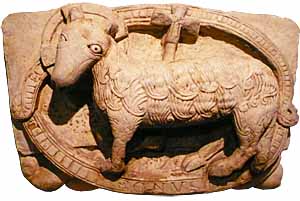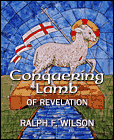
|
Old Testament
New Testament
Gospels
Acts
Paul's Letters
General Letters
Revelation
Topical Studies
Beginning the Journey (for new Christians). en Español

|
Old Testament
New Testament
Gospels
Acts
Paul's Letters
General Letters
Revelation
Topical Studies

|
Home
Bible Studies
Articles
Books
Podcasts
Search
Menu
Donate
About Us
Contact Us
FAQ
Sitemap
Day 12. The Lamb's Book of Life (Revelation 13:7-8)
 Agnus Dei, detail of lost portal, workshop of the master of Cabestany, at monastery Sant Pere de Rodas, Catalonia, Spain, now at Marès Museum, Barcelona. |
While the Lamb wins the decisive battle on the cross, on earth the battle still rages. The Antichrist emerges as the "beast rising out of the sea" (Revelation 13:1), aided by the false prophet, the "beast rising out of the earth" (Revelation 13:12). After he is revealed, the Antichrist persecutes the believers relentlessly.
"7 Also it was allowed to make war on the saints and to conquer them. And authority was given it over every tribe and people and language and nation, 8 and all who dwell on earth will worship it, everyone whose name has not been written before the foundation of the world in the book of life of the Lamb who was slain." (Revelation 13:7-8)
The saints aren't immune from persecution and death, and in that limited sense, the Antichrist "conquers" Christians. Our enemies can kill the body, but not the soul (Matthew 10:28). But the Antichrist's authority doesn't extend to the souls of the believers or martyrs. They are protected. The Book of Revelation describes the great separation between those whose names are written in the book of Life and those who aren't.
"The dwellers on earth whose names have not been written in the book of life from the foundation of the world will marvel to see the beast, because it was and is not and is to come." (Revelation 17:8b)
Census Book of the New Jerusalem
Of course, records have been kept for millennia -- on cuneiform tablets, on scrolls, and on sheets of papyrus or parchment bound into books. In our day, records are stored on vast computer databases.
There are various kinds of records -- histories, lists of kings and their officers, genealogies, commercial transactions, and census documents, among others. The Lamb's Book of Life seems to be a census book that records the names of citizens.60 You see this in a prophecy of Isaiah written about this End Time in Jerusalem, on Mount Zion.
"And he who is left in Zion and remains in
Jerusalem will be called holy,
everyone who has been recorded61
for life in Jerusalem,
when the Lord shall have washed away the filth of
the daughters of Zion...."
(Isaiah 4:3-4a)
The author of Hebrews looks forward to this time as well.
"But you have come to Mount Zion
and to the city of the living God,
the heavenly Jerusalem,
and to innumerable angels in festal gathering,
and to the assembly of the firstborn who are enrolled62 in heaven, "
(Hebrews 12:22-23)
Jesus himself says to the 70 (or 72) disciples when they return from their mission full of stories of miracles and exorcisms,
"Do not rejoice in this, that the spirits are
subject to you,
but rejoice that your names are written63 in heaven." (Luke 10:20)
Paul mentions this book in the context of his fellow workers "whose names are in the book of life" (Philippians 4:3).
In a number of ways, the Book of Daniel at the close of the Old Testament era is a precursor to the Book of Revelation in the New Testament. There Daniel observes two books -- a record of the sins of the wicked (Daniel 7:10), and a record of the names of those who are redeemed.
"At that time shall arise Michael, the great prince who has charge of your people. And there shall be a time of trouble, such as never has been since there was a nation till that time. But at that time your people shall be delivered, everyone whose name shall be found written in the book." (Daniel 12:1)
Perhaps the legend of St. Peter at the "pearly gates" has its origin in this verse that talks about the importance of the book allowing entry into the New Jerusalem.
"But nothing unclean will ever enter it, nor anyone who does what is detestable or false, but only those who are written in the Lamb's book of life." (Revelation 21:27)
Written Before the Foundation of the World (Revelation 13:8)
One of the most remarkable things about the Lamb's Book of Life is that it is written before time itself.
"... Everyone whose name has not been written before the foundation of the world in the book of life of the Lamb who was slain." (Revelation 13:8; cf. 17:8)
This, of course, refers to either predestination or foreknowledge or both. God has known from the beginning who will be saved.
We mortals struggle to understand all this. If it is determined by God, what place is there for man's free will? And so you have Calvinists and Arminians arguing about what we don't really understand. After all, who can really understand predestination except in some abstract, theoretical manner? But just when we think we understand all this, we see a verse such as one that appears in the Letter to the Church at Sardis:
"The one who conquers will be clothed thus in
white garments,
and I will never blot64 his
name out of the book of life.
I will confess his name before my Father and before his angels." (Revelation
3:5)
And the fight begins again. How can man undo what God has determined? We don't really quite understand, but we would be wise not to exclude the idea from our minds as merely hypothetical.65
A number of evangelistic gospel hymns imagine that we can cause our names to be written in the Book of Life by repentance.66 But haven't they already been written there from before the foundation of the world? When we get to heaven, those and many other questions will be answered.
 Available in PDF, and Kindle formats, |
There is a great assurance, however, to know that my name is written in the Lamb's Book of Life! It was written there before my parents ever even hoped for me. "While we were still sinners, Christ died for us! (Romans 5:8). Satan can fight me. He may even cause my demise. But he can never have authority over me. I belong to the Lord! My name is enrolled in the census book of the New Jerusalem.
And, as we'll see on Day 18, when the books are opened on Judgment Day, it will not be anything that I have done -- or failed to do -- that saves me. Rather, it will be my name written in the Lamb's Book of Life! Hallelujah!
Prayer
Thank you, Jesus, for dying for our sins so that our names are "recorded for life in Jerusalem"! Your mercy is so evident! Your decrees so inscrutable, your grace so abundant! Thank you! In your holy name, we pray. Amen.
Day 12 Meditation (Revelation 13:7-8). What is the
significance that a person's name is recorded in the Lamb's Book of Life? When
is that name written, according to Revelation 13:7-8? John wrote these words to
encourage the persecuted church. How do these words reassure you?
https://www.joyfulheart.com/forums/topic/1886-day-12-book-of-life/
Endnotes
(References and Abbreviations)
[60] You see this idea of a census book in Ezekiel, where false prophets are excluded from citizenship in Israel. "They shall not be in the council of my people, nor be enrolled in the register of the house of Israel, nor shall they enter the land of Israel" (Ezekiel 13:9). "Register" (ESV, NRSV), "records" (NIV), "writing" (KJV) is ketāb, "written document," from the verb kātab, "write, record, enroll" (TWOT #1053a). See also Nehemiah 7:64; Exodus 32:32-33; Deuteronomy 9:13-14; Psalm 56:8; 69:28; 139:16; Malachi 3:16. Revelation commentator C. K. Beale writes, "The phrase 'book of life'... is a metaphor for saints whose salvation has been determined; their names have been entered into the census book of the eternal new Jerusalem before history began." (Beare, Revelation, pp. 701).
[61] "Recorded" is kātab, "write, record, enroll" (TWOT #1053).
[62] "Enrolled" (ESV, NRSV), "written" (NIV, KJV) is apographō, "write-off," i.e. "to copy," a common term for the making of copies of official documents. Hence "to enter into a list, register" (BDAG 108, b).
[63] "Written" is graphō, "write," here, "to write down, record," of pronouncements and solemn proceedings (BDAG 207, 2b).
[64] "Blot out" is exaleiphō, "to cause to disappear by wiping," here, "wipe out, erase," (BDAG 344, 1b), from ex, "removal" + aleiphō, "anoint."
[65] We see this concept in the Old Testament (Exodus 32:33). "Blot out" is māḥâ, "wipe, wipeout" (TWOT #1178). Note that erasures in ancient leather scrolls were made by washing or sponging off the ink rather than blotting. 'Wipe out' is therefore more accurate for the idea of expunge. Several times we read about blotting out a record of one's sins (Psalm 51:1, 9; Jeremiah 18:23; cf. Isaiah 43:25; 44.23). Sometimes a memory of a person or nation is blotted out (Genesis 6:7; 7:4; Exodus 17:14; Deuteronomy 9:14; 25:19; 29:20; 1 Kings 14:27; Psalm 109:13).
[66] For example: "Is My Name Written There?" words by Jessie Hunter Brown Pounds (1861-1921). "Book of Life," by Jake Robert Owens (1979), sung by Dolly Parton (1993). "I Know My Name Is There," by Daniel Sidney Warner (1893).
Copyright © 2026, Ralph F. Wilson. <pastor![]() joyfulheart.com> All rights reserved. A single copy of this article is free. Do not put this on a website. See legal, copyright, and reprint information.
joyfulheart.com> All rights reserved. A single copy of this article is free. Do not put this on a website. See legal, copyright, and reprint information.

